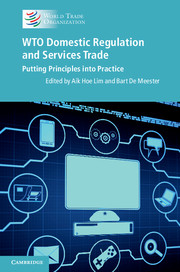Book contents
- Frontmatter
- Contents
- List of contributors
- Foreword
- Disclaimer
- Acknowledgements
- List of abbreviations
- 1 An introduction to domestic regulation and GATS
- Part I Impediments to services trade, regulatory theory and principles
- Part II Legal perspectives on WTO principles and domestic regulations
- Part III Case studies
- 8 Legal services in the United States
- 9 Telecommunications reform in China: fostering competition through state intervention
- 10 Information communications technology: the Mauritian experience of regulation and reform
- 11 Regulation of postal services in a changing market environment: lessons from Australia and elsewhere
- 12 Mobile money services provision in East Africa: the Ugandan experience
- 13 Financial services liberalization and regulation in Japan: implications for future negotiation on market access and domestic regulations
- 14 Domestic regulations in Malaysia’s higher education sector
- 15 Domestic regulations and India’s trade in health services: a study of hospital and telemedicine services
- 16 Operating integrated logistics services in a fragmented regulatory environment: what is the cost?
- 17 Domestic regulation of retail food distribution services in Israel: the missing link between food prices and social protest
- 18 Regulatory impact analysis: addressing the trade and regulatory nexus
- Part IV Concluding remarks
- Index
- References
12 - Mobile money services provision in East Africa: the Ugandan experience
Published online by Cambridge University Press: 05 April 2014
- Frontmatter
- Contents
- List of contributors
- Foreword
- Disclaimer
- Acknowledgements
- List of abbreviations
- 1 An introduction to domestic regulation and GATS
- Part I Impediments to services trade, regulatory theory and principles
- Part II Legal perspectives on WTO principles and domestic regulations
- Part III Case studies
- 8 Legal services in the United States
- 9 Telecommunications reform in China: fostering competition through state intervention
- 10 Information communications technology: the Mauritian experience of regulation and reform
- 11 Regulation of postal services in a changing market environment: lessons from Australia and elsewhere
- 12 Mobile money services provision in East Africa: the Ugandan experience
- 13 Financial services liberalization and regulation in Japan: implications for future negotiation on market access and domestic regulations
- 14 Domestic regulations in Malaysia’s higher education sector
- 15 Domestic regulations and India’s trade in health services: a study of hospital and telemedicine services
- 16 Operating integrated logistics services in a fragmented regulatory environment: what is the cost?
- 17 Domestic regulation of retail food distribution services in Israel: the missing link between food prices and social protest
- 18 Regulatory impact analysis: addressing the trade and regulatory nexus
- Part IV Concluding remarks
- Index
- References
Summary
Introduction
Services constitute a major and growing sector of Uganda’s economy in terms of its contribution to gross domestic product (GDP), exports and employment. Uganda’s Service Sector Export Strategy of 2005 has also identified information and communications technology (ICT) services as a priority. Similar to the situation in many least developed countries (LDCs), Uganda’s services sector is liberal. Specific General Agreement on Trade in Services (GATS) commitments have been undertaken on both telecommunications and financial services. There is a high degree of foreign ownership in Uganda’s financial and telecommunications sectors. In the financial sector, eighteen of the twenty-five commercial banks licensed in 2012 were foreign owned. In the telecommunications subsector, six of the seven operational mobile operators are foreign owned. In addition, this subsector has expanded rapidly in recent years with respect to domestic and foreign-owned mobile service providers (MSPs), the number of mobile subscriptions, and the emergence of non-voice services such as mobile money. Once established in Uganda, foreign and local suppliers of financial or telecommunications services are subject to the same regulatory and supervisory procedures.
East Africa has witnessed a rapid rise in money transfer services through leveraging mobile phone applications and use. First launched in Uganda in 2009, the concept and use of mobile money services provided by licensed telecommunications operators has been steadily growing, with the number of mobile money subscribers reaching about 11 million as of March 2013. While the scope of the service is currently mainly confined to person to person sending and receiving money and the purchase of goods and services, with new technologies and increased competition, more products to further enhance mobile money use are being developed.
- Type
- Chapter
- Information
- WTO Domestic Regulation and Services TradePutting Principles into Practice, pp. 201 - 220Publisher: Cambridge University PressPrint publication year: 2014



